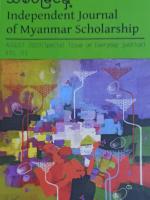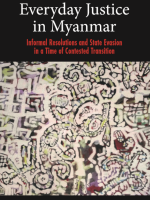Dealing with justice in Myanmar
This special issue on ‘Everyday Justice in Myanmar’ is published in English and Burmese by the Independent Journal of Burmese/Myanmar Scholarship. It includes in-depth studies of how ordinary people in urban and rural Myanmar experience (in)justices and resolve disputes and crimes. Looking into this topic, from an empirical perspective shed light on larger questions about peacebuilding, state-citizen relations, and socio-cultural diversity. The studies are based on fieldwork in some of the most under-studied areas of Myanmar, including impoverished urban wards as well as villages that have experienced decades of armed conflict and that are governed not by the central state, but by local leaders and ethnic armed organizations.
The introductory article by DIIS senior researcher Helene Maria Kyed, provides an overview of the theoretical approach and main findings of the research conducted by the contributors to the special issue. It maps out the legally pluralistic landscape of justice actors and practices and explains the reasons behind the strong preference that ordinary people in Myanmar have for accessing justice at the local level and for avoiding engagement with the official state system. It also investigates some of the differences between justice practices in areas controlled by the central state and areas under the influence of ethnic armed organizations. One of the main arguments here is that the deficiencies of the official justice system – corruption, lack of rule of law, and unfair treatment – provide only one reason for people’s high preference for local, customary, and informal justice. Other reasons include cultural norms, religious beliefs, and socio-economic conditions, which drive people towards a preference for justice outcomes that center not on punitive measures, but on compensation, reconciliation, and conflict-prevention. Political-historical factors, related to decades of military rule, armed conflict, and oppression of especially ethnic and religious minorities in addition drive people away from using the state legal system.
The article by Mi Thang Sorn Poine on ‘Gendered Aspects of Access to Justice in Southern Mon State’ explores the difficulties women face in accessing justice not only in state courts but also within their own communities. This is based on a study of two Mon villages, one that is under the control of the ethnic armed organization, the New Mon State Party (NMSP), and one that is under Myanmar state control. In both villages women are reluctant to raise complaints and report criminal cases not only to the official state system and the NMSP, but also to their local village leaders. There is a mixture of cultural, religious, and social reasons for this. Seeking secular justice is seen to create shame and the loss of face for society as a whole, as women are expected to uphold peace and harmony. Buddhist religious beliefs also inform a view among especially women that being a victim of crime is a kind of punishment for past life deeds. This makes reporting a case redundant and even potentially harmful. Another reason why women do not report cases is due to lack of knowledge of women’s rights and legal procedures. Finally, the fact that most justice providers are men discourages women from seeking secular justice. Instead, many women, turn to spiritual actors, like astrologers, spirit mediums and monks to find inner peace and resolutions to the conflicts and crimes they face.
In a third article titled ‘State-Making and Dispute Resolution in Karen ‘Frontier’ Areas’, Myat The Thitsar and Helene Maria Kyed explore how justice is provided in areas under the partial administration of the ethnic armed organization, the Karen National Union (KNU). It provides an overview of the KNU’s justice system, which operates in parallel to the Myanmar state and is not officially recognized. Nevertheless, many local Karen villagers prefer using the KNU system to the state courts, when crimes and disputes cannot be resolved at village level. The article shows that the KNU’s system has strengthened and expanded after the ceasefire agreement between the KNU and the Myanmar government in 2012. Through a comparative analysis of two different Karen villages, it also shows how the system operates in different ways and how it is weaker in areas where the KNU has less control and where there are many different armed groups. It also highlights how the capacity of village leaders to make decisions in crimes and disputes are affected by the situation of plural external authorities and the co-existence of different laws.
Annika Pohl Harrisson’s article titled ‘Everyday Justice for Muslims in Mawlamyine: Subjugation and Skilful Navigation’ takes us to an impoverished urban ward in Mon state’s capital city, Mawlamyine, where half of the residents are Buddhist and half are Muslim. She shows how religious identity shapes access to justice at the local level. Especially Muslims tend to be treated unfairly in the handling of disputes and crimes by local leaders and not least when monks get involved. While there are no open conflicts between the two religious denominations in the ward, many Muslims have taken on a strategy of ‘local subjugation’ through which they try to avoid confrontation with Buddhists either by refraining from reporting cases or by accepting biased dispute settlements. Harrisson situates these forms of unequal access to justice within a wider context of identity politics in Myanmar, where Muslims are especially subject to exclusion and discrimination.
In the article ‘Spiritual Protection, Justice, and Religious Tensions in the Karen State’, Mikael Gravers also looks at the role od ethno-religious discrimination in accessing justice. Focusing on Karen state he explores the historical emergence and role of an influential monk, who has established his own moral community in an area where an armed Karen group, the Democratic Karen Buddhist Army (DKBA) holds sway. The monk’s activities provide justice and protection to Karen Buddhist followers, but simultaneously creates insecurity and injustices for non-followers, especially Christians and Muslims.
In a sixth article by Lwin Lwin Mon titled ‘Legal Hybridity in Everyday Justice Provision in a Mon Village’, the concept of hybridity is applied to capture how local Mon villagers draw on a mixture of different norms and practices to deal with crimes and disputes outside of the state legal system. She points to the significant role of religious actors as well as spiritual beliefs, in the interpretation of justice matters, and shows how these co-exist in complex ways with the use of law and social media to find solutions to problems.
In the article titled ‘Justice-seeking Strategies in Everyday Life: Case Study Among Urban Migrants in Yangon’, Than Pale takes us to the most populous area of Myanmar’s main city Yangon, the township of Hlaing Thayar. It is home to the largest informal settlements in the country and houses many newcomer migrants, many of whom lack formal residency and strong social networks. Focusing on this group of people, the article presents another example of how certain disadvantaged groups have a much lower chance of getting access justice not only in the official system, but also through local informal channels. Many poor urban migrants simply do not report the crimes they face. This is because they live informally, face an insecure economic situation, and because they are newcomers with few or no social connections to local leaders and other persons who can assist them. Overall, this shows that legal pluralism is not parity, but may benefit certain groups more than others.
Lue Htar’s article titled ‘Everyday Justice and Plural Authorities: insights from Karen State about Land Disputes’ zooms in on how people in government administered areas of Karen State, rural as well as urban, deal with land disputes in hybrid and plural ways, with a particular focus on two land confiscation cases. While pointing out the inadequacies of the current land law and official procedures, Lue Htar shows how victims link up with different actors (monks, ethnic armed persons, the military, educated persons, lawyers), who they believe have the connections and power to give them back their land. She argues that the current political transformation in Myanmar has created insecurity about who has the power to resolve land disputes and this contributes to informality and hybridity. The article also shows how difficult it is to claim back land that has been confiscated by powerful actors.
The special issue was produced under the EverJust project (2015-2021), which constitutes a partnership between DIIS, Aarhus University and two research institutions in Myanmar: the Anthropology department of Yangon University and the Enlightened Myanmar Research Foundation (EMReF). A core aim of the project is to enhance international research collaboration and support social science research capacity in Myanmar, including library sources and trainings in research methods, theory and academic writing. Apart from producing strong empirical evidence that can feed into policy debates on justice and security in Myanmar, a very significant contribution of the project has been to enable Myanmar researchers to publish internationally
DIIS Experts




